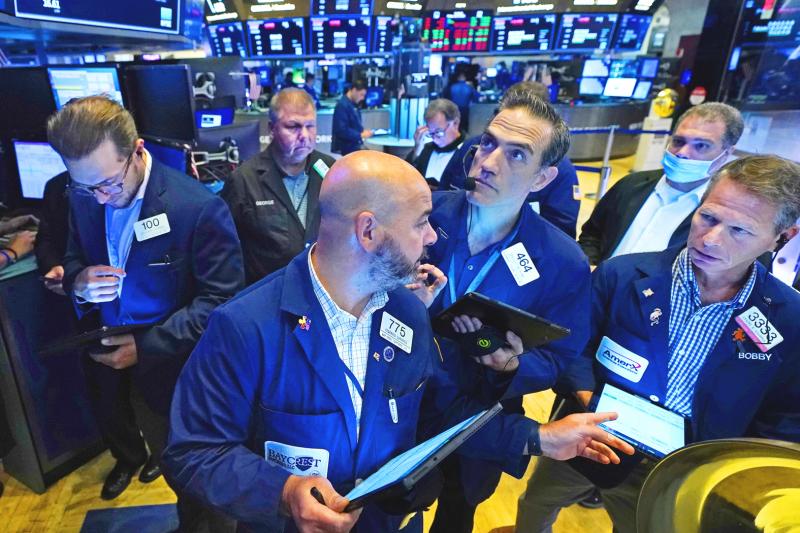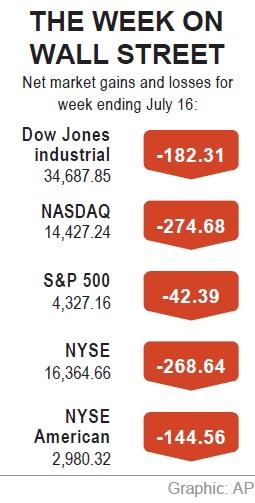Wall Street ended lower on Friday, weighed down by declines in Amazon.com Inc, Apple Inc and other heavyweight technology stocks, while investors worried about a rise in cases tied to the highly contagious Delta variant of SARS-CoV-2.
Los Angeles County on Thursday said that it would reimpose its mask mandate for the weekend.
Public health officials on Friday said that US COVID-19 cases were up 70 percent from the previous week, with deaths up 26 percent.

Photo: AP
Cruise lines Carnival Corp and Norwegian Cruise Line fell about 5 percent.
“COVID is starting to affect the market, ironically, for the first time since last summer, when the reopening trade began,” said Jake Dollarhide, chief executive officer of Longbow Asset Management in Tulsa, Oklahoma.
Amazon and Apple fell more than 1 percent. Nvidia Corp lost 4.2 percent, and the three companies contributed more than any others to the S&P 500’s and NASDAQ’s declines. The S&P 500 technology sector index lost almost 1 percent, dipping for a second session after hitting a record on Wednesday.

The utilities index rallied 1 percent, while the real-estate index edged up 0.1 percent and touched an intraday record high.
This week, investors have balanced worries about a recent inflation spike with reassurances from US Federal Reserve Chairman Jerome Powell that the surge in prices is temporary.
Second-quarter earnings season is set to pick up next week, with reports from companies including Netflix Inc, Johnson & Johnson, Verizon Communications Inc, AT&T Mobility LLC and Intel Corp.
Analysts on average expect 72 percent growth in earnings per share for S&P 500 companies, Institutional Broker’s Estimate System estimate data from Refinitiv showed.
With the S&P 500 up about 15 percent so far this year, investors are expected to look for healthy company forecasts to justify sky-high valuations.
“It’s been hard for the market to gain here from these already elevated prices,” said Rick Meckler, partner at Cherry Lane Investments in New Vernon, New Jersey.
The S&P 500 energy sector index sank nearly 3 percent and ended the week 8 percent lower, with investors worried about expectations for more supply and a rise in COVID-19 cases that raised demand concerns.
Data from the US Department of Commerce showed retail sales rebounded 0.6 percent last month as spending is shifting back to services, bolstering expectations that economic growth accelerated in the second quarter.
The Dow Jones Industrial Average fell 0.86 percent to end at 34,687.85 points, while the S&P 500 lost 0.75 percent to 4,327.16. The NASDAQ Composite dropped 0.8 percent to 14,427.24.
For the week, the S&P 500 fell 0.97 percent, the Dow lost 0.52 percent and the NASDAQ shed 1.87 percent, their fist weekly declines in four weeks.
Declining issues outnumbered advancing ones on the NYSE by a 2.42-to-1 ratio; on the NASDAQ, a 2.21-to-1 ratio favored decliners.
The S&P 500 posted 48 new 52-week highs and no new lows; the NASDAQ Composite recorded 46 new highs and 124 new lows.
Volume on US exchanges was 9.3 billion shares, compared with the 10.3 billion average for the full session over the past 20 trading days.

Taiwan Semiconductor Manufacturing Co (TSMC, 台積電) secured a record 70.2 percent share of the global foundry business in the second quarter, up from 67.6 percent the previous quarter, and continued widening its lead over second-placed Samsung Electronics Co, TrendForce Corp (集邦科技) said on Monday. TSMC posted US$30.24 billion in sales in the April-to-June period, up 18.5 percent from the previous quarter, driven by major smartphone customers entering their ramp-up cycle and robust demand for artificial intelligence chips, laptops and PCs, which boosted wafer shipments and average selling prices, TrendForce said in a report. Samsung’s sales also grew in the second quarter, up

LIMITED IMPACT: Investor confidence was likely sustained by its relatively small exposure to the Chinese market, as only less advanced chips are made in Nanjing Taiwan Semiconductor Manufacturing Co (TSMC, 台積電) saw its stock price close steady yesterday in a sign that the loss of the validated end user (VEU) status for its Nanjing, China, fab should have a mild impact on the world’s biggest contract chipmaker financially and technologically. Media reports about the waiver loss sent TSMC down 1.29 percent during the early trading session yesterday, but the stock soon regained strength and ended at NT$1,160, unchanged from Tuesday. Investors’ confidence in TSMC was likely built on its relatively small exposure to the Chinese market, as Chinese customers contributed about 9 percent to TSMC’s revenue last

LOOPHOLES: The move is to end a break that was aiding foreign producers without any similar benefit for US manufacturers, the US Department of Commerce said US President Donald Trump’s administration would make it harder for Samsung Electronics Co and SK Hynix Inc to ship critical equipment to their chipmaking operations in China, dealing a potential blow to the companies’ production in the world’s largest semiconductor market. The US Department of Commerce in a notice published on Friday said that it was revoking waivers for Samsung and SK Hynix to use US technologies in their Chinese operations. The companies had been operating in China under regulations that allow them to import chipmaking equipment without applying for a new license each time. The move would revise what is known

UNCERTAINTY: A final ruling against the president’s tariffs would upend his trade deals and force the government to content with billions of dollars in refunds The legal fight over US President Donald Trump’s global tariffs is deepening after a federal appeals court ruled the levies were issued illegally under an emergency law, extending the chaos in global trade. A 7-4 decision by a panel of judges on Friday was a major setback for Trump, even as it gives both sides something to boast about. The majority upheld a May ruling by the Court of International Trade that the tariffs were illegal. However, the judges left the levies intact while the case proceeds, as Trump had requested, and suggested that any injunction could potentially be narrowed to apply